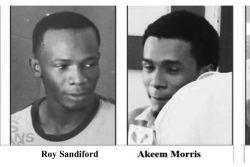Dear Editor,
We thank E. B. John for his letter in SN of 26/6, `More than a hint of equivocation about ANUG’s major objective’ which forces Guyanese to leave our comfort zone and address our perennial problem of ethnic voting in Guyana. Our perspectives and approach will be better as a result of his intervention.
Mr. John asked ‘Given the current climate of disconnection, can it reasonably be expected that the leading contending parties will concede to any local intervention regarding ‘a complete makeover’ without a well-coordinated demand from across a wide spectrum of citizenship …(and) who will be the authors of this fundamental restructuring?’
A New and United Guyana (ANUG) is the only political party that offers the electorate the opportunity to choose a radical alternative, although both the PNCR and PPP/C supported the need for radical change when in opposition. ANUG is committed and will lead the charge. The current imbroglio between the two major parties demonstrates what ANUG has been saying all along: the existing Constitutional structure is not working and change is necessary if Guyana is to progress. Ultimately an ethnically broad and substantial number of citizens, backed by their regional and international partners, will be required to drive the process to fruition. We hold that such an ethnically broad group exists: indeed the establishment of ANUG is rooted in the belief that such a constituency exists and is daily growing.
In this regard, it is the political leadership by both sides which has been the main obstacle. The solution does not lie with them. Therefore ANUG wishes to make the following responses to Mr. John’s observations:
ANUG was established to gain sufficient votes to prevent either the PPP/C or the APNU+AFC from gaining a majority in the National Assembly. It will join neither of the two parties, nor will it take any position in government administration until a constitutionally established shared governance arrangement is implemented. However, it will use such influence as it has to force those parties to work together. We have promised, if legally possible, to make this undertaking justiciable.
ANUG recognizes Mr. John’s appreciation of the importance of ‘the complete separation of powers between the Executive and the Legislative,’ which is one of its central tenets. Where Mr. John asks how this can be done, the answer is in two stages. First, if the Government does not have a majority in Parliament, that house immediately becomes independent, since it will be controlled by the opposition parties. That is the vital first step. Once this is achieved, ANUG will use this leverage in Parliament to broker a real discussion between the Parties which will produce actual institutional separation, where those in the executive/ministers will not be in or have any control over the legislature. The judiciary will also remain institutionally independent. Mr. John finally asks for detailed clarity on ANUG’s call for ‘a constituency system with a mechanism for proportionality’. What ANUG has in mind is the establishment of the maximum number of directly elected constituencies consistent with the need (top-up seats) to maintain proportionality between the votes received at the general elections and the number of seats the party receives in the national assembly. Presently, of the 65 members of Parliament, only twenty five are token representatives of a constituency, the remaining 40 are party appointees. ANUG proposes that no more than ten seats should be for top up, with the majority being appointed by constituencies. Candi-dates should contest in their own names and will be directly accountable to their constituency and can be recalled by their constituency. There must be real accountability; the Guyanese public have been fooled for too long.
Much of the final paragraphs of Mr. John’s missive deals with ANUG’s strategic direction, and he claimed that ‘the reason one competes in any race is to win.’ ANUG entered the political arena so that Guyana can win. While we have ideas over the broad spectrum of social concerns, ANUG is participating in this race to immediately force constitutional reform and believes that this can be accomplished with only a few balancing seats. As you observed, Mr. John, ‘the ‘ethnopolitical’ quagmire in which our society is sunk must be addressed with a passion. We simply cannot endure anymore’ and we hope that ANUG can depend upon the support of people such as yourself.
Yours faithfully,
Kian Jabour
ANUG








